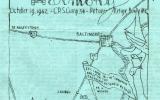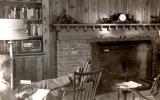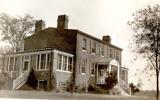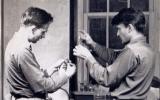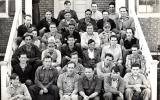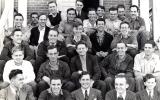CPS Unit Number 034-01
Camp: 34
Unit ID: 1
Title: Fish and Wildlife
Operating agency: BSC
Opened: 6 1942
Closed: 1946
Workers
Total number of workers who worked in this camp: 375
-
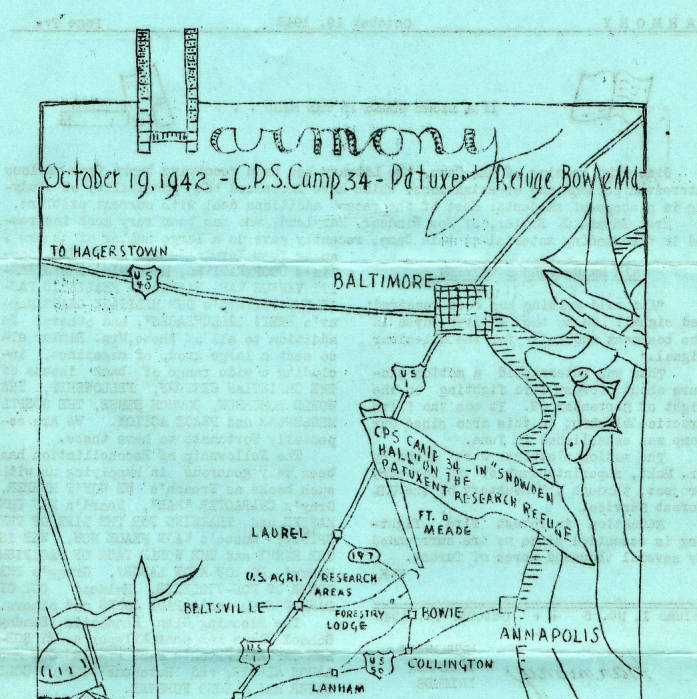 CPS Camp No. 34, subunit 1Harmony was a newsletter published by the men at Camp 34 from August 1942 to October 1943.Digital image from American Friends Service Committee: CPS Records (DG002), Swarthmore College Peace Collection, Swarthmore, Pennsylvania
CPS Camp No. 34, subunit 1Harmony was a newsletter published by the men at Camp 34 from August 1942 to October 1943.Digital image from American Friends Service Committee: CPS Records (DG002), Swarthmore College Peace Collection, Swarthmore, Pennsylvania -
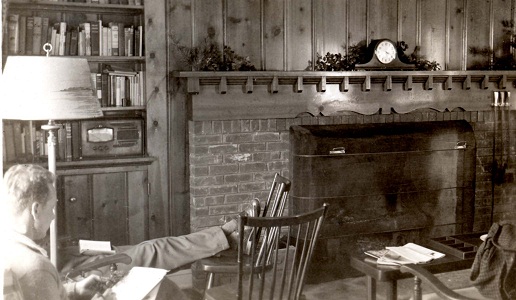 CPS Camp No. 34, subunit 1Bob Lillibridge at Camp 34.Digital image from American Friends Service Committee: CPS Records (DG002), Swarthmore College Peace Collection, Swarthmore, Pennsylvania
CPS Camp No. 34, subunit 1Bob Lillibridge at Camp 34.Digital image from American Friends Service Committee: CPS Records (DG002), Swarthmore College Peace Collection, Swarthmore, Pennsylvania -
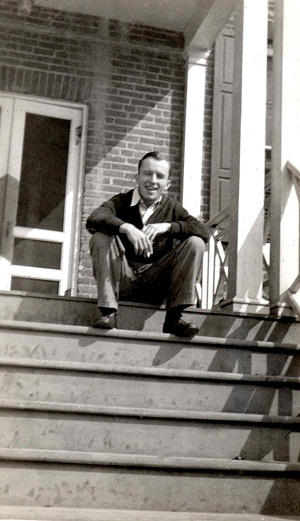 CPS Camp No. 34, subunit 1Dick Stow.Digital image from American Friends Service Committee: CPS Records (DG002), Swarthmore College Peace Collection, Swarthmore, Pennsylvania
CPS Camp No. 34, subunit 1Dick Stow.Digital image from American Friends Service Committee: CPS Records (DG002), Swarthmore College Peace Collection, Swarthmore, Pennsylvania -
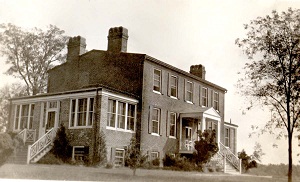 CPS Camp No. 34, subunit 1Snowden Hall on the Patuxent Research Refuge. Camp headquarters.Digital image from American Friends Service Committee: CPS Records (DG002), Swarthmore College Peace Collection, Swarthmore, Pennsylvania
CPS Camp No. 34, subunit 1Snowden Hall on the Patuxent Research Refuge. Camp headquarters.Digital image from American Friends Service Committee: CPS Records (DG002), Swarthmore College Peace Collection, Swarthmore, Pennsylvania -
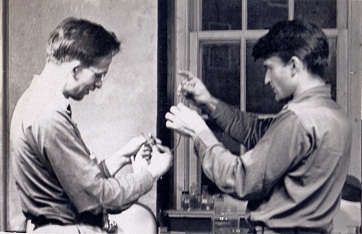 CPS Camp No. 34, subunit 1Watts & Klingensmith. Stomach tubing rats, Patuxent Refuge, 1945.Digital image from American Friends Service Committee: CPS Records (DG002), Swarthmore College Peace Collection, Swarthmore, Pennsylvania
CPS Camp No. 34, subunit 1Watts & Klingensmith. Stomach tubing rats, Patuxent Refuge, 1945.Digital image from American Friends Service Committee: CPS Records (DG002), Swarthmore College Peace Collection, Swarthmore, Pennsylvania -
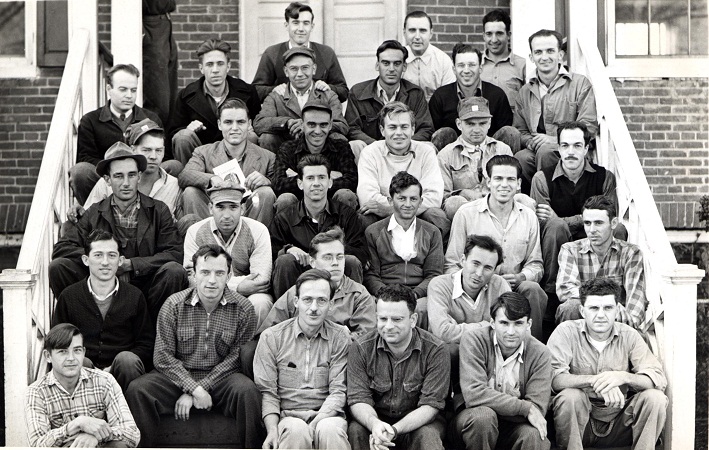 CPS Camp No. 34, subunit 1Bottom row: [Charles or Robert] Mitchell, [Jerome W.] Watts, [Leon] Greenwald, [Clarence W.] Klingensmith, [Arthur B.] Weaver; 2nd row: [W. Hartman] Rice, [Richard W.] Stowe [Stow], [John W.] Brainerd, [Francis W.] Marburg, [___] Showalter; 3rd row: [___] Faltz[sp?], [___] Bengal[sp?], [Chandler S.] Robbins, [Luke L.] Weaver., ]David E.] Metzler; 4th row: [Carl E.] Stump, [Roger D.] Way, [Emery] Stoltzfus, ___, [Calvin] Bumbaugh, [Osborn] Finch; 5th row: [James L.] Whitehead, [Hubert R.] Marshall, [___] Stump,[Clarence] Stoltzfus, [Harry] Richard, [Reuben J.] Goodling [or Jay Good?]; 6th row: [LeRoy E.] Plum, [Walter E.] Forster, [Mark W.] Wolfe.Digital Image from American Friends Service Committee: Civilian Public Service Records (DG002), Swarthmore College Peace Collection, Swarthmore, Pennsylvania
CPS Camp No. 34, subunit 1Bottom row: [Charles or Robert] Mitchell, [Jerome W.] Watts, [Leon] Greenwald, [Clarence W.] Klingensmith, [Arthur B.] Weaver; 2nd row: [W. Hartman] Rice, [Richard W.] Stowe [Stow], [John W.] Brainerd, [Francis W.] Marburg, [___] Showalter; 3rd row: [___] Faltz[sp?], [___] Bengal[sp?], [Chandler S.] Robbins, [Luke L.] Weaver., ]David E.] Metzler; 4th row: [Carl E.] Stump, [Roger D.] Way, [Emery] Stoltzfus, ___, [Calvin] Bumbaugh, [Osborn] Finch; 5th row: [James L.] Whitehead, [Hubert R.] Marshall, [___] Stump,[Clarence] Stoltzfus, [Harry] Richard, [Reuben J.] Goodling [or Jay Good?]; 6th row: [LeRoy E.] Plum, [Walter E.] Forster, [Mark W.] Wolfe.Digital Image from American Friends Service Committee: Civilian Public Service Records (DG002), Swarthmore College Peace Collection, Swarthmore, Pennsylvania -
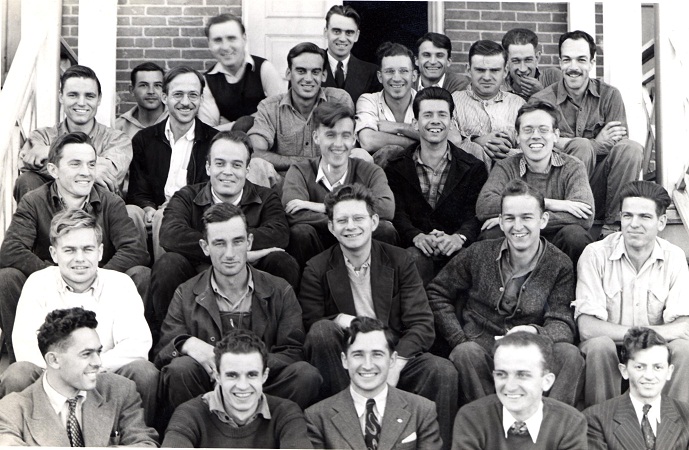 CPS Camp No. 34, subunit 1Group Photo 2. Bottom row: [Herbert S.] Zim, [Werner C.] Baum, [___] Yoder, [Jay M.] Good [or Reuben J. Goodling?], [Luke L.] Weaver; 2nd row: ___, [___] Faust [sp?], [Melvin] Willbach, [___] Glick, [Davie E.] Metzler; 3rd row: [Clyde] Vance, [James L.] Whitehead, [LeRoy E.] Plum, [Chandler S.] Robbins, [John W.] Brainerd; 4th row: [Roger D.] Way, [Jerome H.] Watts, [Clarence] Stoltzfus, [Harry D.] Richard; 4th row: [Charles or Richard Mitchell], [Walter E.] Forster, [Emery K.] Stoltzfus, [Clarence W.] Klingensmith, [___] Bruch.Digital Image from American Friends Service Committee: Civilian Public Service Records (DG002), Swarthmore College Peace Collection, Swarthmore, Pennsylvania
CPS Camp No. 34, subunit 1Group Photo 2. Bottom row: [Herbert S.] Zim, [Werner C.] Baum, [___] Yoder, [Jay M.] Good [or Reuben J. Goodling?], [Luke L.] Weaver; 2nd row: ___, [___] Faust [sp?], [Melvin] Willbach, [___] Glick, [Davie E.] Metzler; 3rd row: [Clyde] Vance, [James L.] Whitehead, [LeRoy E.] Plum, [Chandler S.] Robbins, [John W.] Brainerd; 4th row: [Roger D.] Way, [Jerome H.] Watts, [Clarence] Stoltzfus, [Harry D.] Richard; 4th row: [Charles or Richard Mitchell], [Walter E.] Forster, [Emery K.] Stoltzfus, [Clarence W.] Klingensmith, [___] Bruch.Digital Image from American Friends Service Committee: Civilian Public Service Records (DG002), Swarthmore College Peace Collection, Swarthmore, Pennsylvania
CPS Camp No. 34, Subunit 1, a Fish and Wildlife Service base camp located in Bowie, Maryland operated as a special project with both the Departments of Agriculture and Interior on the Patuxent Wildlife Refuge. Jointly administered by the Brethren Service Committee, The American Friends Service Committee and The Mennonite Central Committee, the camp opened in June 1942. The Brethren assumed leadership of the camp in 1945. Men worked in wildlife experiments and studies and maintained the refuge and forest.
The camp was located approximately five and a half miles east of Laurel, Maryland.
Directors: Milo Yoder, Allen Bacon, Clyde Weaver, Duane Ramsey
According to Gingerich, in April 1943, nineteen Mennonites were among the sixty assignees, who reported a diversity of religious affiliations when entering CPS.
The camp roster also included men who worked in “detached service” at a variety of locations on National Service Board of Religious Projects carried out in cooperation with the AFSC, BSC, MCC and other agencies. While much project work occurred in Chicago, New York City, Philadelphia, Washington, D. C., men also worked at relief centers or special projects in California, Illinois, Indiana, Kansas, Maryland, Ohio, Pennsylvania. Subunits [2] through [6] describe that work.
Men performed a variety of work assignments, most connected with wildlife experiments and studies. They planted trees and worked in the tree nursery. In addition, they maintained the refuge and forest areas.
Lester Zimmerman from Inman, Kansas, for most of his time at Patuxent, “worked in the research office doing experiments on tree injuries”. According to his daughter, Judy Zimmerman Herr, “Being stationed near Washington, D.C., provided opportunity to visit sights there and in the East”. (“Detour . . . Main Highway”: Our CPS Stories pp. 77-78)
From August 1942 through October 1943 the men at Bowie published a camp paper called Harmony. The men in camp also read The Weekly Processor, published at Hagerstown, Maryland from March to May in 1946, and distributed from Bowie.
For more information on work and life in Brethren camps see Leslie Eisan, Pathways of Peace: A History of the Civilian Public Service Program Administered by the Brethren Service Committee. Elgin, IL: Brethren Publishing House, 1948.
For more information on camp work, life and programs see Melvin Gingerich, Service for Peace: A History of Mennonite Civilian Public Service. Akron, PA: Mennonite Central Committee printed by Herald Press, Scottdale, PA 1949.
For general information on CPS camps see Albert N. Keim, The CPS Story: An Illustrated History of Civilian Public Service. Intercourse, PA: Good Books 1990.
For personal stories of CPS men, see Peace Committee and Seniors for Peace Coordinating Committee of the College Mennonite Church of Goshen, Indiana, “Detour . . . Main Highway”: Our CPS Stories. Nappanee, IN: Evangel Press, 1995, 2000.
For a story of one couple’s long engagement during CPS, including photos and love letters during a period of a long deferred marriage, see Redeemed, A Reflective Chronology of the Lives of Fred E. Augsburger and Carolyn King Augsburger by Ruth Ann Augsburger and Owen E. Burkholder, www.orabooks.com, 2011. The book can also be found at The Menno Simons Library at Eastern Mennonite University, Harrisonburg, VA.
See also Mulford Q. Sibley and Philip E. Jacob, Conscription of Conscience: The American State and the Conscientious Objector, 1940-1947. Ithaca, NY: Cornell University Press, 1952.
Swarthmore College Peace Collection, Camp periodicals database.
